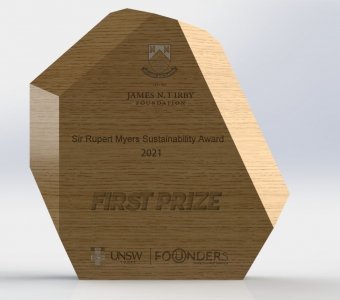Scaling up marine restoration with a New Wave of Seapods
New Wave Cohort 8 finalists and Marine Ecologists Adriana Verges and Mariana Mayer Pinto dream of re-greening our underwater ecosystems. As founder and chief investigator of Operation Crayweed, Adriana is on a mission to restore Sydney’s lost underwater seaweed forests, an effort which won the Green Globe Award in 2017.
Fellow marine ecologist and zoologist Mariana co-leads the Living Seawalls project to revive our increasingly urbanised oceans through ecologically enhancing structures. From humble beginnings in Sydney Harbour, the project has scaled to three continents, and made the finals of the inaugural Earthshot Prize. They took their latest project, Seapods, to the UNSW Founders’ New Wave program, to explore options for commercialising their research.
Developing seeds for underwater forests
Their respective marine restoration projects meant Adriana and Mariana were perfectly placed to see the need for Seapods.
“There is a well-recognised need for marine restoration, but it is still very costly,” explained Mariana. “It involves divers, navigating technical issues, and labour. Therefore it is still very challenging to do marine restoration at bigger scales.”
Adriana’s research focuses on restoring algal forests, seagrass meadows, and the impact of climate change on underwater environments.
“We know the impact of climate change is occurring at scale, but our restoration projects remain quite small,” explained Adriana.
Their Seapods project aims to ramp up their restoration efforts.
“How can we optimise restoration methodologies, so we can restore marine environments at the same scale as the impact is happening?” asked Mariana. “How do you make marine restoration feasible and cheaper - something you could throw off a boat?”
“Seapods are like seeds for trees, but underwater,” explained Mariana. “The idea is that you would put seagrass shoots, plus all the nutrients, sediments and bacteria it needs to grow into a pod that dissolves in water. We can drop the seapod in the ocean. Once the pod dissolves, you could have luxurious meadows. It is currently in development.”
From doom and gloom to hope for our oceans
As marine ecologists leading some of the biggest restoration and rehabilitation projects in Australia, they both saw the need to optimise marine restoration projects at scale, and show the positive impact of scientific endeavour.
“I started by documenting our impact on our oceans, which can be a bit gloomy,” said Mariana. “As a scientist, as a citizen, as a mother, you start to ask, how can I change this? It’s very important to show people that it’s not all doom and gloom. There is still hope. We are quite successful in a lot of our projects, which is rewarding. The Living Seawalls are seeing increasing diversity in marine built infrastructure, which is amazing. When you replant crayweed and see babies, it’s awesome! It’s working! Nature is responding.”
Adriana heard about New Wave through an internal UNSW email, and raised it with Mariana as an opportunity to commercialise their research. Participating in the program, however, required a shift in mindset.
“Researchers are very cautious in terms of what we tell people, or the implications of our work, because we have a scientific methodology to follow,” explained Mariana. “Commercialising your research is a whole different world. You need to open your mind, open your heart, and jump into it!”
Sustainability innovators seize chance to collaborate
What set the night apart was the level of collaboration between founders in the sustainability space.
“Of all our areas of focus, sustainability is where collaboration shines the brightest,” said Gregory. “People working in sustainability want to work with others in this space, so events like these really help to bring them together. One of the highlights for me was seeing our teams in the breakout rooms exchanging details, so they could build collaborative projects in the future.”
Indeed, the event attracted founders from beyond UNSW Founders, such as Xylo Systems, led by animal bioscientist and University of Sydney MBA Student, Camille Goldstone-Henry.
“The next generation of founders fully understand the ramifications of our unsustainable economy and it’s fantastic to see their energy applied to solving the great sustainability challenges of our time,” said David Burt, UNSW Director of Entrepreneurship. “It reflects what we aim to achieve by embedding entrepreneurship at UNSW - that is, to see startups drive innovation throughout our economy and across every industry.”
“We’re proud to support sustainable innovation at UNSW through events like these,” James Kirby, director of the James N Kirby foundation. “It was wonderful to witness the depth and breadth of talent on the night, each eager to forge a more sustainable future.”

